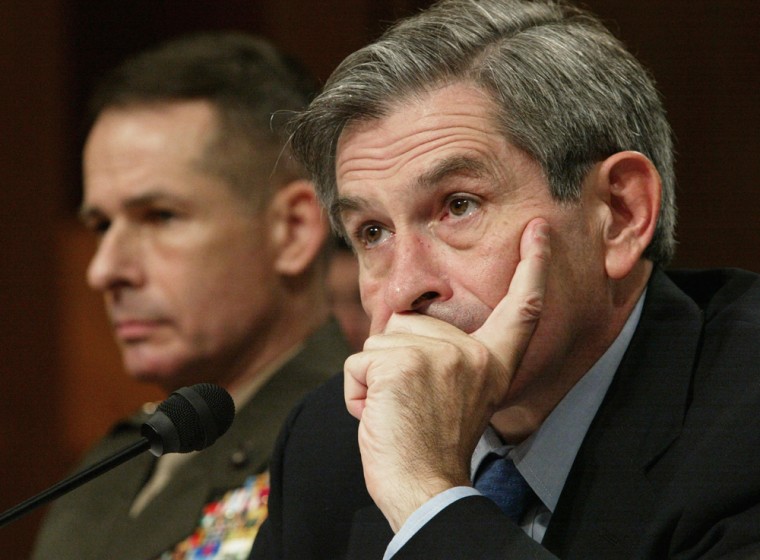Bush administration officials predicted Thursday that new spending requests for military operations in Iraq and Afghanistan will total more than $50 billion in the next fiscal year, which starts Oct. 1.
Members of the Senate Armed Services Committee said they’re likely to approve the money, but some berated Deputy Defense Secretary Paul Wolfowitz for what they saw as slipshod budgeting.
Committee members indicated they’d likely approve both the president’s request for a short-term $25 billion “reserve fund” to bridge any spending shortfall between now and January and the request for additional money in January.
“I’ll give $50 billion, I’ll give $100 billion,” said Sen. John McCain, R-Ariz., but he attacked Wolfowitz for what he called “disingenuous” spending estimates.
U.S. military operations now cost about $4 billion a month in Iraq and between $600 million and $800 million a month in Afghanistan.
Committee members indicated they weren’t surprised by Wolfowitz’s statement that the administration would seek more money in January, but expressed annoyance at the ad hoc manner in which the president has been asking Congress to pay for the operations in Afghanistan and Iraq.
“There is no reason not to be direct on this issue and to acknowledge what the costs are,” Sen. Carl Levin, D-Mich., chided Wolfowitz, accusing him of continuing “to fudge the reality that this war is costing us about $4.6 billion a month. … We ought to have an honest presentation of a supplemental request” rather than the reserve fund Bush has proposed.
'Most of us want to provide funds'
He added, “I think most of us want to provide funds; we want a supplemental (spending bill). It’s pretty ironic. We’ve been trying to pressure this administration to cough up a request for the additional money. … The administration refused to do that until now.”
Both Levin and McCain voted for the $87 billion supplemental spending request that Bush submitted last October.
Democratic presidential candidate Sen. John Kerry, D-Mass., said in a statement Thursday he would support the administration's new request for funds. It was a reversal for Kerry who voted against the $87 billion request last October.
"The situation in Iraq has deteriorated far beyond what the administration anticipated," Kerry said. "This money is urgently needed, and it is completely focused on the needs of our troops. We must give our troops the equipment and support to carry out their missions in Iraq and Afghanistan."
Levin derided the proposed reserve fund as “a $25 billion blank check” because he said it did not allow enough congressional control over how the money would be spent.
Wolfowitz testified that the money would go for such needs as fuel for helicopters and tanks, as well as body armor for troops and armor reinforcement of Humvees.
Money for more troops?
“I am intrigued that there is no mention in this set of priorities of increased personnel costs,” McCain said. “We have 20,000 additional personnel there (in Iraq) now. I think we need more. I said we needed more nine months ago.”
He asked Wolfowitz, “Do we need more troops and, if so, how many?”
Wolfowitz replied, “You’re absolutely right, we needed more in recent months than we had anticipated and we don’t know what were going to need next winter or next spring.”
The rancor on the committee prompted Sen. Joe Lieberman, D–Conn., a strong supporter of the effort to topple Saddam Hussein, to voice his worry.
“We all ought to be unified,” he said. The quarreling over precise methods of funding, he worried, “may lead others to question more than they should the willingness of Congress to continue to support our troops” and may cause “more conflict than we ought to have.” Lieberman suggested that Bush simply submit a new supplemental request for current costs instead of creating a reserve fund.
For now, even opponents of the Iraq war such as Rep. Dennis Kucinich, D-Ohio, said Thursday there is no growing sentiment in Congress to cut off funds for Iraq or put time limits on the U.S. deployment.
"There is an underlying flawed logic which is keeping us in Iraq and at war against Iraq," Kucinich said Thursday. "Until we break through that logic, we'll be there no matter what."
Asked about the effect on his constituents of the Abu Ghraib prison abuse furor and the murder of Nicholas Berg by Islamic zealots, Sen. Rick Santorum, R-Pa. said Berg’s murder proved that “there are terrorists there in Iraq who want to hurt Americans. It is the same organization that inflicted the damage on Sept. 11. If there is any question that our effort in Iraq is part of the war on terrorism, this was a very direct answer on the part of al-Qaida.”
If the intent in beheading Berg was to intimidate the American people, Santorum said, “they continually misread the United States and the American public.”
